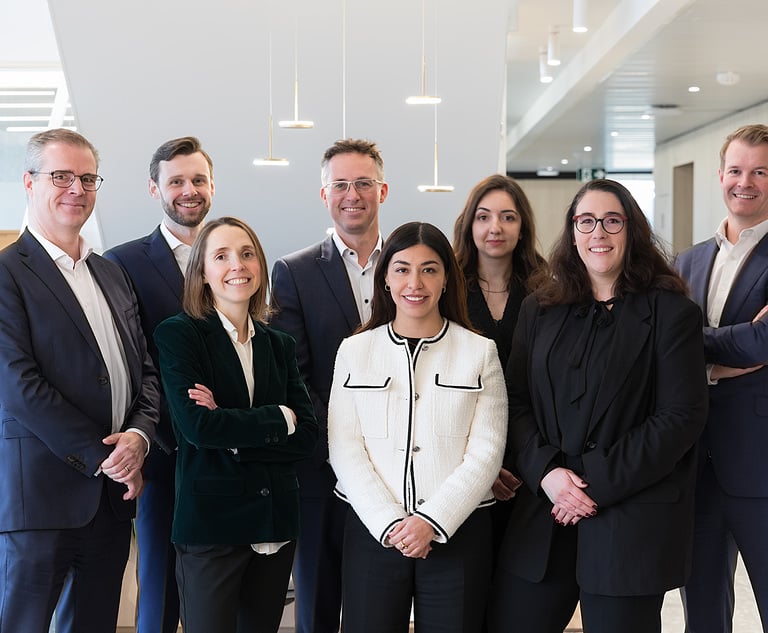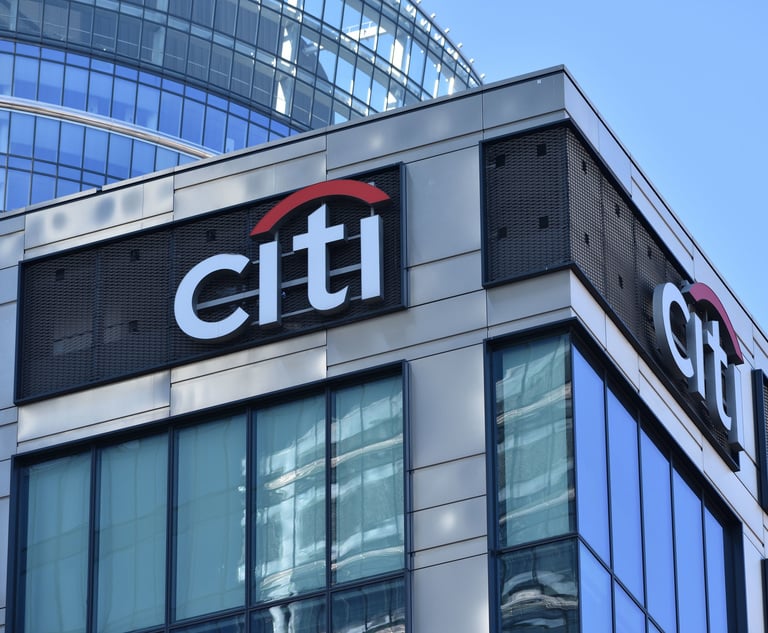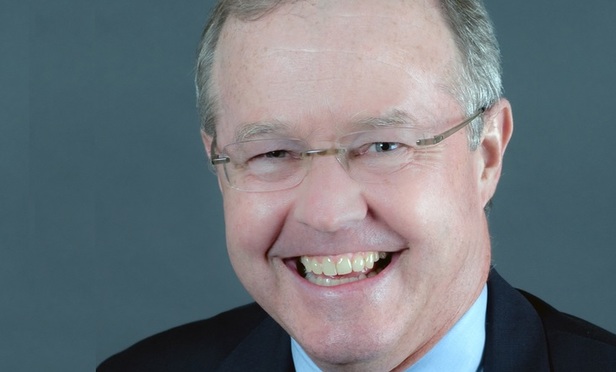Shearman posts 18% PEP hike after partner de-equitisations as London revenues rise 14%
US posts 6% revenue rise as equity cuts bolster partner profits
February 22, 2017 at 09:56 AM
5 minute read
Shearman & Sterling's partner profits spiked by nearly 20% last year, as the firm posted revenue growth across several practices while also cutting back its equity partner ranks.
The firm saw revenue rise 6% to $912.5m (£731m), boosted by strong performances in M&A, international arbitration, asset management, real estate and project finance, said senior partner Creighton Condon (pictured).
Correspondingly, revenue per lawyer rose 5.9% to $1.085m (£870,000), as total headcount stayed steady at 840 lawyers last year, including 187 in London.
Condon said London revenues rose by 14% to $169.7m (£136m), citing a "strong year across multiple practices". He added that the firm continues to see London as a vibrant legal market, regardless of Brexit. UK law, together with US law, will continue to be the governing law of a very high percentage of matters, he said, adding: "We will see room for growth in London."
The London office revenue has grown 63% between 2010 to 2016.
London managing partner Nick Buckworth said: "London had a strong year. It is a great accolade to the partners in this office who remained nimble and flexible throughout what was a very difficult year. Our energy business was extremely profitable. Projects and M&A also did well. Capital markets was interesting: there was a slow start to the year approaching the Brexit vote but they went out after and really hit the markets hard."
Meanwhile, the stunning leap in profits per equity partner (PEP), up 18% to $2.165m (£1.74m), came as the firm's total equity partner ranks decreased by 22 to 140, its smallest number in recent years.
The firm confirmed last year that it de-equitised some partners. Condon, noting that some thinning of the equity ranks was tied to retirements, declined to say how many were de-equitised. He said the de-equitisation effort, which cut across a variety of practices and locations, related to only a small portion of the profit rise.
"The driver of the profitability," he said, was increased revenue, a focus on higher margin work and better management, including by reducing write-offs and improving realisation.
Last year's financial figures mark a turnaround from 2015, when average PEP fell nearly 4%, to $1.8m (£1.4m), while gross revenues grew just under 2%.
But Condon said the de-equitisation last year was "less about driving profits than being able to grow our business".
"We want to be able to have this structure to be able to facilitate growth," he said, adding that the firm has had non-equity partners, but now it's "a more formalised status".
While many Wall Street firms still maintain a one-tier partnership structure, Condon said: "Most firms that are global in the same way we are have a non-equity partner status, so we're effectively moving toward a model most firms are following."
"For us, it's a flexibility issue to be able to grow the partnership," he said.
Condon said he's not expecting any other significant changes in equity partner ranks this year, adding: "We think we're at the right configuration."
Despite the jump in partner profits, net income rose just 1.5% to $302m (£242m) last year. Condon confirmed that increasing associate compensation was a factor in keeping net income growth down. "Rising associate salaries were unbudgeted by all law firms," he noted.
While the firm saw improvement in several key practice areas, he said the practice areas "under pressure" were capital markets and leveraged finance, given market volatility.
And while Shearman has been frequently selected as litigation counsel for banking clients in recent years, he said, financial institutional litigation may begin to slow down. The firm is focusing on growing its docket of corporate client base litigation to counteract a decrease in litigation and investigations for financial institutions, he said.
Condon is optimistic about 2017, noting that the firm is on a "very strong trajectory", with overall revenue growth rising more than 20% in the past four years and PEP rising more than 30% in that timeframe.
Still, he acknowledges the outside challenges facing any large global firm: volatility from political events across the world and intensifying competition among high-end firms amid flat demand for legal services. In such an era, Shearman's growth comes from taking other firms' market share, he said.
"Your growth depends on an increase in your percentage of the market as opposed to a growing market, and the past four years we have been successful in doing that," he said.
Some of Shearman's most prominent work last year included advising General Electric (GE) on several transactions, including the combination of GE's oil and gas business and Baker Hughes to create a new publicly traded company; and advising B/E Aerospace in its $6.4bn (£5.1bn) sale to Rockwell Collins, a deal combining two large suppliers in the aerospace industry.
In capital markets, the firm advised the underwriters of Valvoline Inc.'s $759m (£609m) initial public offering.
Meanwhile, the firm is conducting an investigation on behalf of Wells Fargo's board into the bank's sales practices, after it was disclosed that millions of customer accounts may have been opened without authorisation.
Separately, Quinn Emanuel Urquhart & Sullivan's London office posted a 22% rise in revenue over 2016 to £44.8m.
Total turnover in the City increased from £36.8m to £44.8m. Profits rose 21% from £27.1m to £32.8m.
The firm has hired multiple London lateral partners during the past 12 months, including Macfarlanes head of financial services David Berman, Herbert Smith Freehills construction disputes partner James Bremen and Addleshaw Goddard civil fraud head Mark Hastings.
This content has been archived. It is available through our partners, LexisNexis® and Bloomberg Law.
To view this content, please continue to their sites.
Not a Lexis Subscriber?
Subscribe Now
Not a Bloomberg Law Subscriber?
Subscribe Now
NOT FOR REPRINT
© 2025 ALM Global, LLC, All Rights Reserved. Request academic re-use from www.copyright.com. All other uses, submit a request to [email protected]. For more information visit Asset & Logo Licensing.
You Might Like
View All
Singapore Litigators Shift Competitive Landscape as Another Senior Duo Sets Up Own Shop

Squire Patton Boggs Hires 7-Lawyer Team to Beef Up ESG Practice in Brussels
2 minute read

Skadden, White & Case Guide Citigroup Demerger in Mexico
Trending Stories
- 1Meet the New President of NY's Association of Trial Court Jurists
- 2Lawyers' Phones Are Ringing: What Should Employers Do If ICE Raids Their Business?
- 3Freshfields Hires Ex-SEC Corporate Finance Director in Silicon Valley
- 4Meet the SEC's New Interim General Counsel
- 5Will Madrid Become the Next Arbitration Hub?
Who Got The Work
J. Brugh Lower of Gibbons has entered an appearance for industrial equipment supplier Devco Corporation in a pending trademark infringement lawsuit. The suit, accusing the defendant of selling knock-off Graco products, was filed Dec. 18 in New Jersey District Court by Rivkin Radler on behalf of Graco Inc. and Graco Minnesota. The case, assigned to U.S. District Judge Zahid N. Quraishi, is 3:24-cv-11294, Graco Inc. et al v. Devco Corporation.
Who Got The Work
Rebecca Maller-Stein and Kent A. Yalowitz of Arnold & Porter Kaye Scholer have entered their appearances for Hanaco Venture Capital and its executives, Lior Prosor and David Frankel, in a pending securities lawsuit. The action, filed on Dec. 24 in New York Southern District Court by Zell, Aron & Co. on behalf of Goldeneye Advisors, accuses the defendants of negligently and fraudulently managing the plaintiff's $1 million investment. The case, assigned to U.S. District Judge Vernon S. Broderick, is 1:24-cv-09918, Goldeneye Advisors, LLC v. Hanaco Venture Capital, Ltd. et al.
Who Got The Work
Attorneys from A&O Shearman has stepped in as defense counsel for Toronto-Dominion Bank and other defendants in a pending securities class action. The suit, filed Dec. 11 in New York Southern District Court by Bleichmar Fonti & Auld, accuses the defendants of concealing the bank's 'pervasive' deficiencies in regards to its compliance with the Bank Secrecy Act and the quality of its anti-money laundering controls. The case, assigned to U.S. District Judge Arun Subramanian, is 1:24-cv-09445, Gonzalez v. The Toronto-Dominion Bank et al.
Who Got The Work
Crown Castle International, a Pennsylvania company providing shared communications infrastructure, has turned to Luke D. Wolf of Gordon Rees Scully Mansukhani to fend off a pending breach-of-contract lawsuit. The court action, filed Nov. 25 in Michigan Eastern District Court by Hooper Hathaway PC on behalf of The Town Residences LLC, accuses Crown Castle of failing to transfer approximately $30,000 in utility payments from T-Mobile in breach of a roof-top lease and assignment agreement. The case, assigned to U.S. District Judge Susan K. Declercq, is 2:24-cv-13131, The Town Residences LLC v. T-Mobile US, Inc. et al.
Who Got The Work
Wilfred P. Coronato and Daniel M. Schwartz of McCarter & English have stepped in as defense counsel to Electrolux Home Products Inc. in a pending product liability lawsuit. The court action, filed Nov. 26 in New York Eastern District Court by Poulos Lopiccolo PC and Nagel Rice LLP on behalf of David Stern, alleges that the defendant's refrigerators’ drawers and shelving repeatedly break and fall apart within months after purchase. The case, assigned to U.S. District Judge Joan M. Azrack, is 2:24-cv-08204, Stern v. Electrolux Home Products, Inc.
Featured Firms
Law Offices of Gary Martin Hays & Associates, P.C.
(470) 294-1674
Law Offices of Mark E. Salomone
(857) 444-6468
Smith & Hassler
(713) 739-1250









